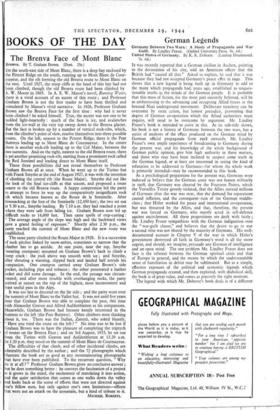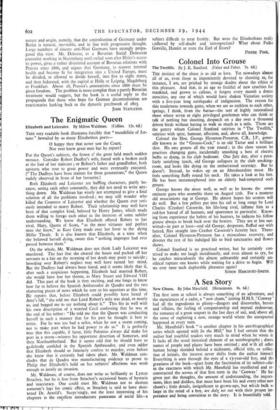German Legends
Germany Between Two Wars : A Study of Propaganda and War
7s. 6d.)
IT was recently reported that a German civilian in Aachen, pointing to the devastation of his city, told an American officer that the British had "caused all that." Asked to explain, he said that it was because they had not accepted Germany's peace offer in 1940. This shows that a new legend is being built up in Germany to add to the many which propaganda had; years ago, established as unques- tionable truths in the minds of the German people. It is probable that this mass of fiction, for the most part sincerely believed, will be as embarrassing to the advancing and occupying Allied forces as the boasted Nazi underground movement. Deliberate treachery can be overcome by stern action, but honest prejudice, preventing that degree of German co-operation which the Allied authorities must require, will need to be overcome by argument. Mr. Lindley Fraser's book is intended to assist in this. As its sub-title shows, his book is not a history of Germany between the two wars, but a series of analyses of the effect produced on the German mind by German official propaganda from 1918 onwards. Mr. Lindley Fraser's own ample experience of broadcasting to Germany during the present war, and his knowledge of -the whole background of German public opinion, give him high authority in these matters, and those who may have been inclined to suspect some truth in the German legend, or at least are interested in seeing the kind of refutation to be addressed to Germans—for whom the whole work is primarily intended—may be recommended to this book.
As a psychological preparation for the present war, Germans were induced to believe that the German army was not beaten militarily in 1918, that Germany was cheated by the Fourteen Points, which the Versailles Treaty grossly violated, that the Allies starved millions of Germans after the war was over, that the demand for reparations caused inflation, and the consequent • ruin of the German middle- class ; that Hitler worked for peace and international co-operation, but was thwarted by the Allies, and that, therefore, the present war was forced on Germany, who -merely acted in self-defence against encirclement. All these propositions ate dealt with fairly ; Mr. Lindley Fraser sympathises with the German indignation over the "war-guilt clause," and believes that the desire to go to war a second time was not shared by the majority of Germans. His well- documented account in Chapter V of the way in which Hitler's government destroyed all faith in Germany's word is all the more cogent, and should, we imagine, persuade any German of intelligence and an open mind. The one problem Mr. Lindley Fraser does not face is the relation -between the German spiritual crisis and that of Europe in general, and the means by which the understandable sense of humiliation in defeat may be sublimated. But as a simple, effective exposure of the political and economic legends which German propaganda created, and then exploited, with diabolical skill, the book is of great value, and comes at precisely the right moment.
. The legend with which Mr. Doberer's book deals is of a different nature and origin, namely, that the centralisation of Germany under Berlin is natural, inevitable, and in line with progressive thought. Large numbers of sincere anti-Nazi Germans have strongly propa- gated this view. Mr. Doberer, as a Bavarian Social Democrat journalist working in Nuremberg until exiled soon after Hitler's access to power, gives a rather disjointed account of Bavarian relations with Prussia since 1866, and argues that Germany, to recover internal health and become fit for integration into a United Europe, must be divided, or allowed to divide herself, into five to eight states, and then federated, with the capital at Halle or Leipzig, Magdeburg or Frankfurt. Above all, Prussia's ,annexations since i866 must be given freedom. The problem is more complex than a purely Bavarian treatment would suggest, but the book is a useful reply to the propaganda that those who hope for German decentralisation are reactionaries harking back to the dynastic patchwork of 1813.
jOHN STAPLETON.



























 Previous page
Previous page